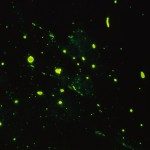Présentation
In collaboration with the Institute of Vertebrate Biology in Brno, Czech Republic (Dr. Natalia Martinkova and Markéta Harazim), the aim of this project is to study the mechanisms of lyssavirus infection in bats based on in vitro models, using different continuous cell lines.
This study will be focused on the cellular response to infection, especially at the level of the innate immunity, using RNAseq approaches.
The current knowledge concerning the response (in particular immune) of bat cells during infection by lyssaviruses is largely unknown, thus the data that we will obtain will make it possible to obtain a first overview of the genes involved in this infection.





